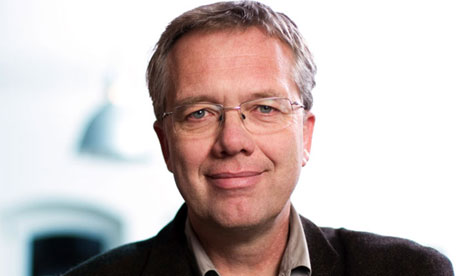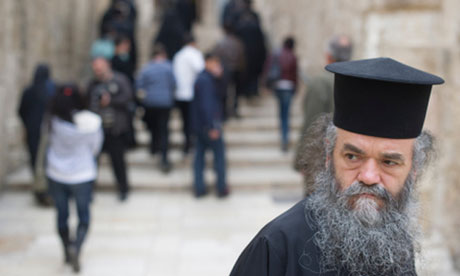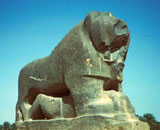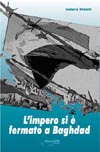'Everybody says: "This is my city"' ... 24 Hours Jerusalem. Photograph: Maurice Weiss/Ostkreuz/Zero One Film
April 13, 2014
24 Hours Berlin director Volker Heise explains why he chose to shoot his latest documentary in Jerusalem, and explains why the city is like a puzzle with pieces that don't fit.
• Follow the 24 Hours Jerusalem project at the dedicated website 24hjerusalem.tv and submit your own Vine videos via #24hjerusalem on Twitter
In the era of the modern documentary, rare is the film-maker who prays that nothing out of the ordinary happens on the day of shooting. Yet that was exactly the concern on Volker Heise's mind a year ago today, when he began filming his real-time study of Jerusalem, an ambitious multi-camera, multiple-perspective study that aims to look beyond the city's headlines and present the everyday stories of the people that live there.
The project began eight years ago, with a trial run in Berlin. Says Heise, an avuncular, self-deprecating 52-year-old north German who apologises for his English not being "proper": "I always thought about the idea of, how can I narrate a city? In literature you have Ulysses by James Joyce, or Berlin Alexanderplatz by Alfred Döblin, or Manhattan Transfer by John Dos Passos. But how could I do this visually? Then one day I read an article in an English newspaper about English historians, and they asked all the people in England to write them letters, telling them what they were going to do on one specific day. They asked them to send only the ordinary days of their everyday lives.
The hour between 17-1800 hours of the 24h Jerusalem project. Visit the dedicated website 24hjerusalem.tv to watch full replay including the second screen experience.
Reading on mobile? Click here to watch 17-1800 hours on the livestream
"I thought it was a brilliant idea," he continues. "Brilliant because nobody asks people what they do in their ordinary lives – they only want to hear exceptional things. So I thought, why don't we do this with cameras? Everybody has cameras on their mobile phones. And the next step was, why don't we do it on TV? That was the initial idea for the Berlin project. We started to think about it and I said, 'OK, we will shoot one day and we will broadcast one day. We only narrate everyday life, and we do it in real time. So what you see at 9am happened at 9am, and we do it exactly one year later on the same day.'"
The result, 24 Hours Berlin, was a modest success on TV in German and France, and it was Heise's producing partner, Thomas Kufus, who suggested Israel, having some financing partners there. "I thought it was perfect," says Heise. "If we were going to do it in another city, we had to do it in Jerusalem. Because Jerusalem is so different. It's not a normal city like Berlin, London, Paris or Moscow – just another big European city. It's really different. You don't know where the borders are. Because the Palestinians have other ideas about it to the Zionists. It has three religions and every religion says, 'Jerusalem is ours.'
"It involves many issues that people around the world are talking about at the moment," he continues. "Religion and politics, modern and traditional life – you have it there in Jerusalem. One of our protagonists said, 'If you want a clash of cultures, come to Jerusalem. It's here and it happens every day. It needs only a little thing and the city is going to explode.' Of course, that is different to Berlin. Nothing is going to explode there. But I was in Berlin before the Wall, so I do know what it means to live in a city where you don't what's going to happen the next day. That story is over for Berlin, but it's still going on in Jerusalem."
 Volker Heise, director of the 24 Hours Jerusalem project. Photograph: Maurice Weiss/Ostkreuz/Zero One Film
Volker Heise, director of the 24 Hours Jerusalem project. Photograph: Maurice Weiss/Ostkreuz/Zero One Film
The first step was to make connections. "Thomas had made a lot of co-productions with Israel," says Heise, "so he knew some people there. But that was not enough. We started three years before the shooting day with the research, and I was there, I'd say, every two months for a week or two, to build up trust. It's not like here in Europe – I call someone in England and we make a deal. That's not going to work there, especially with the Palestinian side. You have to talk to people. Somebody told me at the border control in East Jerusalem into Palestine that you can sit together with people and drink tea for seven or eight hours, and maybe after that you're going to work together!"
Such a shoot was plainly going to be complicated. Heise spent six months in Jerusalem before the shooting date, overseeing a research team from Europe, plus an Israeli team and a Palestinian team. Says Heise: "I told them, what we want to do is, we want to start with all the cliches – we have to have a rabbi, a priest, an imam and, of course, somebody from the more radical Palestinian side and somebody from the more radical Zionist side. Those were the obvious things we had to have, and from there we could go into more detail."
 Photograph: Maurice Weiss/Ostkreuz/Zero One Film
Photograph: Maurice Weiss/Ostkreuz/Zero One Film
Finally, there were 20 camera teams assembled for the shoot, following not just religious types but ordinary working people, juxtaposing a high-end estate agent with a protest group who occupy empty houses. "It's about everyday life," says Heise. "I thought we should show the city through the lives of the protagonists," he explains. "And then when people saw it, they would maybe understand more about this country. I didn't want to say, 'This is right,' or 'This is wrong,' or, 'This is the one who should be the owner of Jerusalem.' I wanted to have all the parts, like a puzzle with many pieces. But mostly the pieces don't fit together."
Heise admits that there was plenty of pressure during the shoot, but who did it come from? "Everybody," he says. "Because everybody says, 'This is my city,' and they try to influence you. But during pre-production I always said: 'We are independent film-makers. That is our point of view and nothing else. We have to watch the city from this point of view and film the lives of the people who live here. We have to do it in such a way that afterwards we can say, 'OK, we tried to have a balance between the different groups. We tried our best not to be more on one side than on the other side.'"
 Photograph: Maurice Weiss/Ostkreuz/Zero One Film
Photograph: Maurice Weiss/Ostkreuz/Zero One Film
The editing process comprised four stages. After taking the footage to Berlin, Heise put it under the supervision of two editors, one Israeli and one Palestinian. There were four editing rooms, and the first thing assembled was a rough cut ("to see what was in the material"). That alone took five months, with teams working in three parallel editing rooms: one team did the first hour, the second did the second and the third did the third. Then they started over again.
The result is an extraordinary vision of the city that will be broadcast on French-German TV station Arte and German station Bayerisches Fernsehen, but is also an ambitious multimedia project that can be accessed via the 24 Hours Jerusalem website. After his experience with 24 Hours Berlin, Heise knows that the minutiae of the everyday has a compelling appeal.
"In Berlin, people many watched it for many hours," he says. "They said, 'Let's watch for half an hour, and after seven hours they said, 'OK … '" He laughs. "We made the programme in a way that you really can watch 24 hours. Every half hour there's a break, but also we made it in such a way that if you watch it during the day, it's easy to do something else at the same time. It's like a parallel life. It's on the whole day, and you can go in and out, and you see always something new. You have a new window in your house – and it looks out at Jerusalem."
• Follow the 24 Hours Jerusalem project at the dedicated website 24hjerusalem.tv and submit your own Vine videos via #24hjerusalem on Twitter
Source: The Guardian




















